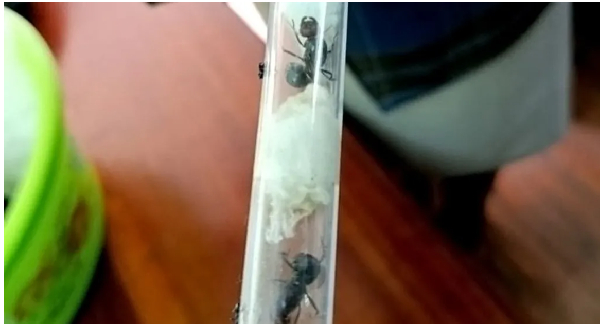Ant smugglers caught with hundreds of prized insects in Kenya

Four men have pleaded guilty in Kenya to trying to smuggle hundreds of highly sought-after ants out of the country.
The Kenya Wildlife Service (KWS), which is more used to protecting larger creatures, such as lions and elephants, has described this as a “landmark case”.
The contraband included giant African harvester ants, which are valued by some UK dealers at up to £170 ($220) each.
The case showed a “disturbing shift in trafficking patterns – from iconic mammals to lesser-known species that are vital to ecological balance”, the KWS said.
The suspects had concealed the creatures in “specially modified test tubes and syringes” which would have enabled the insects to survive for two months, the KWS said.
There was also a “calculated attempt to bypass security systems” by obscuring the contents of the tubes.
Photographs of the illegal haul shared by the KWS show hundreds of these containers packed with cotton wool, each with two or three ants.
The exact number of insects involved is still being evaluated but KWS spokesperson Paul Udoto told the BBC this was the country’s first case of “bio-piracy” on this scale.
The four suspects – two Belgians, a Vietnamese and a Kenyan – were arrested after what the KWS has described as “a co-ordinated, intelligence-led operation”.
It is believed that the intended destinations were the exotic pet markets in Europe and Asia.
The KWS said the demand for rare insect species is growing. Collectors keep them in special habitats, known as formicariums, and watch them build their colonies.
The giant African harvester ant – or Messor cephalotes – is the largest of its species and can grow to around 20mm, with the queen growing up to 25mm.
Pat Stanchev, the general manager of insect-dealing website Best Ants UK, said that it is their “big and beautiful size” that makes them attractive for those who want to keep them as pets.
He does not sell the giant African harvester ant but told the BBC that he is aware of people who try to pass on illegally imported insects.
In Kenya, the ants are protected by international bio-diversity treaties and their trade is highly regulated.
“This prosecution sends a strong message that Kenya will enforce compliance… and marks a significant step forward in Kenya’s fight against unconventional wildlife crimes,” the KWS said.
The four men are due to be sentenced on Tuesday.

The insects were destined for Europe and Asia where collectors keep them as pets, the KWS said
Source: bbc.com





